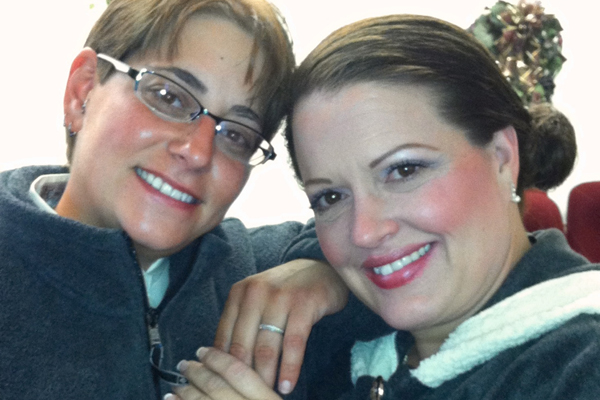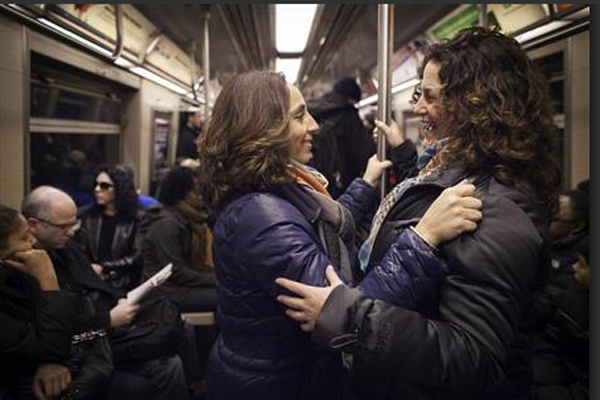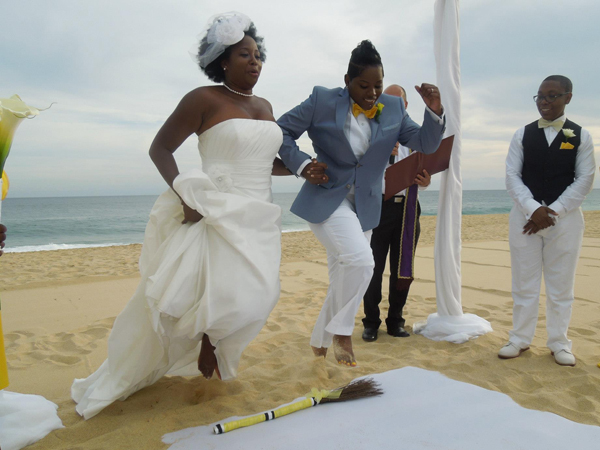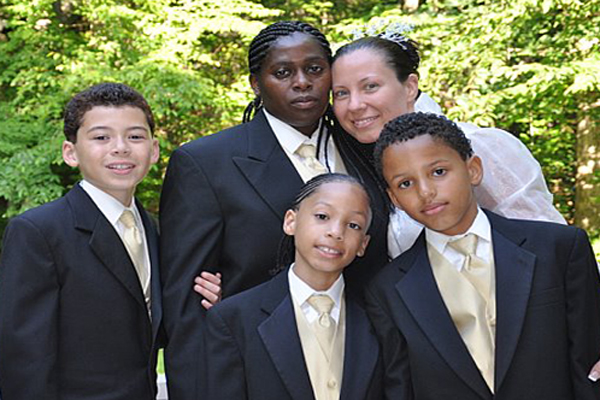This is what DOMA discrimination looks like
December 07, 2012
For the over sixteen years, the so-called Defense of Marriage Act has continually harmed same-sex couples and their families by placing marriages between same-sex couples in a lesser class than marriages between different-sex couples. DOMA prohibits the federal government from respecting marriages between same-sex couples and mandates unequal treatment, depriving same-sex married couples of over 1,100 protections and responsibilities that different-sex married couples receive.
The law affects all married same-sex couples: It interferes with immigration policy, it makes federal tax procedures more difficult, and it undermines states with the freedom to marry by failing to respect those relationships at the federal level.
DOMA has been ruled unconstitutional more than ten times in the past two years, and in a few short months, the U.S. Supreme Court will be reviewing Windsor v. United States, one of the key DOMA challenges, at the federal level. It is more urgent than ever that we make a strong case for the freedom to marry in the court of public opinion so that our advocates can make the same strong case in the courts of law. We know that it's time to dump DOMA, and we know that we can show the Supreme Court justices that when they do the right thing, it will stand the test of time and prove that the Court is on the right side of history.
Hundreds of thousands of same-sex couples and families are hurt by DOMA. These are real couples with real challenges and real stories. And until DOMA is repealed, these couples and families will continue being hurt. Read their stories, and click through for more on each family:
1. Heather Morgan and Maria del Mar Verdugo
Maria, a citizen of Spain, and Heather, an American from New York City, married nearly two years ago and are now living in Manhattan. Maria works in marketing, but if she were to lose her job, she'd also lose her work visa, which already is set to expire in 2013. If this happens, she'll have to return to Spain, and she and Heather could be separated. READ THEIR STORY IN REUTERS.
2. Pablo Garcia and Santiago Ortiz
Santiago and Pablo married in Connecticut last year, although they have been in love for over 26 years. 26 years ago, Santiago asked Pablo to move from Pablo's home in Venezuela to live with Santiago in the United States. Santiago was HIV positive and needed the man he loved by his side, and the couple did not have time to deal with getting the proper visa for Pablo. Now, Pablo's request for permanent residence in the United States has been denied, although foreign nationals in marriages with different-sex partners are routinely extended this courtesy. READ THEIR STORY IN REUTERS.
3. Gemma and Jessica Perkins
Although Gemma and Jessica married on September 16, 2011 in the United States, they have been separated due to the country's immigration policies. Since Gemma is from the United Kingdom and her work visa has expired, she has had to return to the UK. The couple made huge financial sacrifices because Gemma couldn't move to the United States, and in July, Jessica was forced to move to the United Kingdom in order to stay with her wife. READ THEIR STORY.
4. Cristina Alcota and Monica Ojeda
Cristina, an American citizen, and Monica, an Argentine national, married in Connecticut. But because DOMA prevented the federal government from honoring their marriage for the purpose of immigration, they faced a year-long struggle in hearings to prevent Monica from being deported. In December 2011, Immigration & Customs Enforcement closed their deportation case, marking the first time that ICE has closed a case involving a married same-sex couple. READ THEIR STORY.
5. Herbert Burtis and John Ferris
Herbert and John fell in love in 1948 while studying in college, but they had to wait until 2004, when Massachusetts approved the freedom to marry, in order to tie the knot. John passed away in 2008, and when Herbert went to the Social Security office to apply for survivor benefits, he was denied. The couple is a plaintiff in the Gill v. O.P.M. case. READ THEIR STORY on NPR.
6. Mignon Moore and Elaine Harvey
This summer, after ten years together, Mignon and Elaine, who live in Los Angeles, CA, got legally married in their native New York City. But when they returned to their home in California, they knew that their marriage was no longer respected. "We feel like we're in limbo," Mignon explained. "We stand between two worlds - one where we are legally married and we have your relationship recognized in that way, and the other in a place where people don't have a clear idea of who we are and what we mean to each other. It's that kind of insecurity that underlies our union. READ THEIR STORY.
7. Josh Snyder and Stephen Hill
Army Major Stephen Hill and his husband Joshua Snyder married in Washington, D.C. last year. But because of DOMA, they don't receive the same protections that different-sex married couples in the military receive. If something were to happen to Josh at home, Steve would be unable to take emergency leave because the military does not recognize their relationship. If something happened to Josh, Steve would not be considered next-of-kin, although different-sex couples would be. READ THEIR STORY.
8. Geraldine and Suzanne Artis
Geraldine and Suzanne live as a married couple in Clinton, Connecticut with their three sons. Because of DOMA, which, in part, prevents same-sex couples from filing their federal taxes jointly, both women are not allowed to claim all three of their children as dependents. Some years, Geraldine claims the children, and in other years, Suzanne claims the children. This inconsistent filing leaves the couple feeling insecure. "If the papers say that I'm the only parents, or vice versa, I worry that if something happened to one of us, would there be any issue?," Suzanne said to Gay & Lesbian Advocates & Defenders, the law organization behind Gill v. Office of Personnel Management, for which Geraldine and Suzanne serve as key plaintiffs. READ THEIR STORY.
9. Charlie and Karen Morgan
CW2 Charlie Morgan recently returned from a deployment in Kuwait, and she is now battling incurable stage-four breast cancer. Should she not survive, her wife would be unable to access any of the survivor benefits that she would need to take care of their five-year-old daughter Casey Elena. Same-sex couples like Charlie and Karen are blocked from receiving protections like these survivor benefits because of DOMA, a federal law that forces the U.S. military to discriminate against same-sex couples and deny them over 1,000 protections and responsibilities afforded to different-sex couples. READ THEIR STORY.
10. Ashley and Jill Myers-Black
Ashley and Jill live in Florida, but this fall, they traveled to New York to get married. The day - September 22 - meant a lot to the couple. Ashley explained that she finally felt like her relationship was being granted the dignity and respect it deserved. She said, "Here we are in a healthy, stable, loving relationship, and yet here we are in one way or another having to defend that each day. It wears on a person - it wears on a relationship. No matter how strong a person or relationship is, it takes its toll. I realized after the wedding how nice it felt, if for only one day to not have to explain or defend or rationalize. I felt important, I felt loved, and I felt like my relationship was respected and validated." DOMA ensures that Ashley and Jill will continue to see their relationship disrespected in their home state of Florida. LIKE THEIR PHOTO.
11. Corri Planck and Dianne Hardy-Garcia
Corri and Dianne have lived in California since 2003. They were one of the 18,000 same-sex couples who married in the state between June 2008, when the CA Supreme Court extended the freedom to marry to same-sex couples and November 2008, when Proposition 8 took that freedom away. Although they are legally married, the Defense of Marriage Act complicates things for the couple - and their two young daughters - on the federal level. There are major financial costs associated with the federal government's lack of respect for their marriage. "It's a huge concern for how we plan for our future regarding our family finances," Dianne said. "The fact that we won't be able to inherit each other's Social Security is a big deal. The fact that we have to find accountants who can file our tax returns in the particular way they have to be filed is a big deal. The fact that we have to worry about these financial issues as we try to figure out our daughters' college education is a big deal. These are very real issues." READ THEIR STORY.
12. Rachel and Jennifer Corbett
Rachel and Jennifer married on November 1, 2012 in New York. However, they live in Ohio, where same-sex couples do not have the freedom to marry. This discrepancy - that New York respects their marriage but the federal government and the state of Ohio does not - results in complicated financial challenges and deprives them of the dignity and respect afforded to different-sex married couples.

13. Stuart and Art Metcalfe-LeSieur
Although Stuart and Art are married in the state of Massachusetts, they cannot apply for a spousal visa so that Stuart, a citizen of the United Kingdom, can live with Art in San Antonio, Texas, where Art works as a music teacher. "No marriage should have to endure this kind of stress and separation simply because of a discriminatory law," Art wrote for Get Equal. "We're simply asking for a chance to be together and to share the same civil rights that our friends, neighbors, and family enjoy." READ THEIR STORY AT GETEQUAL.













